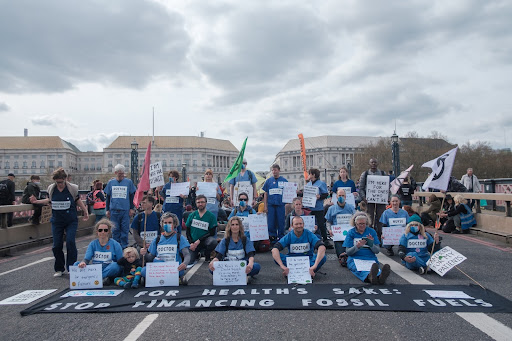At the end of this week, global health community representatives, policy makers, climate experts, economists and civil society will be meeting at COP27 (GCHA page on COP27) in Egypt. This year’s location could not be more emblematic for the United Nations climate conference, as accelerating impacts of global warming sicken and kill hundreds of thousands every year across the African continent, as developing countries in Africa and around the world grapple with overwhelming impacts of a climate crisis not of their own making.

*free image* Source: https://unsplash.com/photos/YCXXRMRgU8Y
Yet, according to the UN, so far only 26 countries out of 193 have intensified their climate action commitments since last year, despite agreeing to do so at COP26 one year ago. Climate finance that has been promised to low income countries to help them adapt to climate change and make the clean energy transition has still not been delivered. And to date, there is not even a process in place for funding for the losses and damages lower income countries are experiencing.
Climate change is unquestionably a health issue – climate-sensitive health threats already cause millions of avoidable deaths annually, undermining the right to health and a healthy environment, and driving severe productivity losses because of the human health impacts of extreme heat – yet governments and decision-makers do not yet fully recognize the health threat that climate changes poses.To date, integration of health issues into policymaking and monitoring under the UNFCCC has been insufficient, despite IPCC warnings of human health impacts since 1990.
And yet the health benefits of climate measures can not only save hundreds of thousands of lives in the countries that implement them, but these health benefits can offset the costs of actions, with even greater benefits if policies are explicitly designed with health in mind. Solutions exist – for clean energy access, for healthy sustainable food systems, for energy efficient buildings and for cities designed for healthy and clean transportation – they just need to be openly shared, and deployed at scale. While we can’t stop some of the significant impacts of climate change already set in motion, we can still ensure a much healthier and more sustainable future for humanity with the actions we take now.
At COP27, the health community is calling for governments to take action in four key areas: loss and damage, mitigation, adaptation and finance.
During COP27, governments must establish a clear process for delivering finance to lower income countries for the loss and damage these countries are experiencing from climate change, including for the damage to people’s health, and to health systems.
Governments must also commit to a deadline for full and just fossil fuel phase-out as a public health imperative, and define how this will be delivered through the UNFCCC Mitigation Work Program. Only a complete phase-out of fossil fuels will deliver the full health benefits of cleaner air, protection from the health harms from climate change, and protection from the health harms caused by fossil fuel extraction, transport, processing and use. The 2022 Lancet Countdown report published at the end of October makes it clear that fossil fuels are completely incompatible with a healthy future.
Wealthy nations must immediately meet the long overdue $100B global climate finance goal to support low income countries in their climate mitigation and adaptation, including making up for the shortfall in what was delivered between 2020-2021. Half of this funding should be allocated to climate adaptation, and much greater investment must be made in health systems and programs.
Finally, there is a clear and immediate climate action that governments can take to protect people’s health and well-being, by integrating health metrics into the Global Goal on Adaptation and the Global Stocktake as key measures for assessing global progress on delivering the Paris Agreement.
The healthcare sector itself has a vital role to play in both adaptation and mitigation: as one of the three sectors most often prioritized for adaptation in Parties’ nationally determined contributions (NDCs), the healthcare sector contributes 4-5% of global emissions and can contribute to global emissions reductions efforts. Meanwhile, governments must invest to make their healthcare systems more resilient in the face of climate impacts, and to provide universal access to healthcare so that people are healthier to begin with.
Mitigation and adaptation efforts across sectors can reduce health impacts, but health-related loss and damage as a result of insufficient mitigation and adaptation are growing. International finance is urgently needed to facilitate mitigation and adaptation, as well as to address loss and damage.
Healthy populations, which can be ensured by mitigation and adaptation efforts across sectors, are necessary for both economic productivity and overall climate resilience, being more likely to withstand and recover from climate shocks. This can be understood as health resilience.
Health is therefore both a prerequisite for and a critical indicator of climate action. It is also a powerful accelerator for climate action: framing and monitoring climate action in health terms can build widespread support for ambitious action, and yield high economic returns on investment.
The global health community has been working relentlessly to achieve these goals. Our presence at COP27 is crucial to build a deeper understanding of the issues at stake and to call upon governments to put health at the center of climate action.
by Jeni Miller, Executive Director, Global Climate and Health Alliance
*** Follow GCHA on Twitter for the latest COP27 developments and what they mean for health ***

